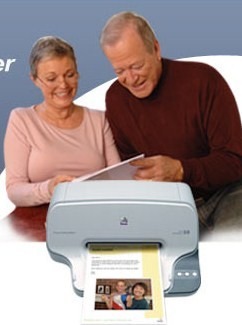How Tablets Can Connect the Disconnected
Many of us have heard stories about tablets being more accessible for those who have trouble dealing with PCs. Grandmothers, for example, who have never used a computer, get hold of an iPad and start tapping away like an old pro. What is it about tablets that make them so engaging, and make them so much more appealing than using a PC for some people? Let's face it, PCs can be complicated. If you know nothing about using one, setting up a PC could be an insurmountable task. You have software to install, inexplicable error messages, antivirus notifications always popping up...
For some people, especially older people, all they want to do is get email, see pictures of family, and maybe do a little shopping. Why do they need to install the Office Suite, or worry about defragmenting?
My mother-in-law, for example, hates going near a computer. She doesn't know how to use a mouse, and she actually still uses a camera with film. When I tell her that someone emailed me about a family event, she still says things like "Oh, yes, that's what they do these days, isn't it? They just email, they don't need to call." And she shakes her head, as if it is just so surprising. She was so happy and shocked that we could watch clips from American Idol on YouTube the day after the show aired. "It's amazing what they can do these days on these computers." We've tried on several occasions to get her hooked up, and signed up for email addresses that are now languishing.
There have been many attempts to make getting email easier for older people especially. And there are special email devices like the Peek, and email printers like Presto, that try and help older people connect with their younger counterparts, who don't know what a stamp is and don't print pictures anymore.

But these solutions only address email. What if someone wants to go online and research a product, play a game, watch video, find out more about a health issue, or even go on Facebook? Even using email is too old fashioned for many "kids these days". If a grandparent really wants to keep up with the grandkids and see the latest photos, he or she is going to need to be on Facebook. So tablets may be the perfect solution for older types that don't want to bother with a PC, but want more than just email. My mother in law (who is 64), has not tried a tablet, but I could see her taking to it. The touch screen interface is so much easier to deal with than a keyboard, it seems. When there is something you want to see, you just tap it. There is only the screen to deal with, not the screen, the mouse and the keyboard.
David Worthington, on PC World, interviewed his mom about her experience using an iPad, which is her first computer. Her reactions were very interesting. She had never had an email address, and found it really exciting that she could now join the online world:
David: Has your experience made you more eager to delve into it and learn more?Mom: Yeah. I'm doing more and more of that lately. I'm learning from my mistakes, and beginning to use Google.
David: What do you like about it?
Mom: That I have an e-mail address – you know. 'Cause that's the first thing [people] ask you: 'What's your e-mail address?' So now, that makes me feel that I'm part of something-and then I feel that I can see and do more things now than I did before, because I didn't have it a computer.
She was even able to update apps without really knowing she was doing it. And checking email was easy: "go just push the e-mail, and then it goes to it real fast." No web addresses to remember, nothing to type.
Tablets may not be the death of PCs as some people have predicted, but they may just bring in some who have been left behind by PCs, and make the online world more accessible. And that's a great thing.
Do you have anyone who is "computer-phobic" in your family that has tried a tablet? What was their experience?
